
11 minute read
Is It
Legal to Offer Discounts and Waive Patient Copayment & Deductible Obligations?
By: Daniel J. Schulte, J.D., MSMS Legal Counsel
Advertisement
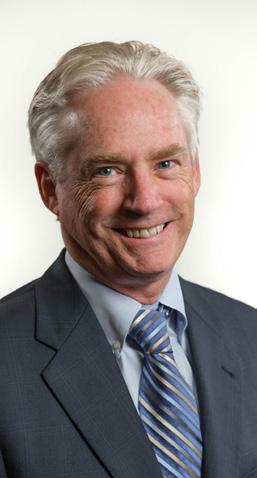
I am planning to build my private practice by offering patients discounts and/or to waive their copayment or deductible obligations. Is this legal? Must it be done on an “across the board” basis or can I instead be selective in deciding which patients to offer the waivers?
Unlike other businesses physicians and others providing health care services are subject to constraints on their ability to determine the amount of the fees for their services and when waivers of copayments and deductibles is permissible. First, the terms and conditions of your contracts with third party payers must be considered. These contracts typically restrict your ability to discount your fee and waive copayment and deductible obligations. You must carefully review all these agreements prior to doing so.
Second, Michigan's Health Care False Claim Act (the "False Claim Act") makes it illegal to submit a claim for payment to a third party payer that contains a statement of fact or that fails to reveal a material fact that is misleading. Discounting a fee for a patient covered under a policy issued by a health care corporation or health care insurer or waiving such patient's copay or deductible obligation without disclosing this fact could constitute the submission of a claim which fails to reveal a material fact. In the absence of the disclosure it will appear to the health care corporation or health care insurer that your fee for the service provided was more than what was actually charged. Therefore, the claim may be deemed "deceptive" and "false" under the False Claim Act. The False Claim Act also prohibits the "rebate" of all or any portion of your fee if the rebate is given to a patient in consideration of that patient providing you a referral(s) to other patients.
Third, the Federal Department of Health and Human Services (HHS) has taken the position that the routine (i.e. “across the board”) waiver of Medicare copayments and deductibles by health care providers could be a violation of the Federal False
Claims Act and the Federal Anti-Kickback statute. HHS' theory is that if the waiver of the patient's copayment and/or deductible was based upon any reason other than the patient's financial hardship (e.g. referrals of patients by the patient whose deductible or copayment had been waived) violations of these Federal statutes would likely be deemed to have occurred. In guidance issued by HHS, it has been made clear that only the "routine" Medicare and/or Medicaid copayments and deductibles would subject the health care provider to HHS scrutiny for violation of these Federal statutes. To the contrary, waivers of Medicare and/or Medicaid copayments and deductibles made on a case-by-case basis due to a finding of patient's financial hardship would not subject the health care provider to such scrutiny. To protect yourself the best practice is to have a written policy in effect in your practice setting forth the criteria that is used to determine when copayment and deductible obligations will be waived and to limit those waivers to only those cases where a financial hardship combined with a documented need for care is present. F
MSMS Quarterly Membership Updates
Activate Your Political Voice
The Michigan Doctors’ Political Action Committee (MDPAC) is the political arm of the Michigan State Medical Society. MDPAC supports pro-medicine candidates running for the State legislature, Michigan Supreme Court and other statewide positions. Join today!
Please be sure to join Dr. Tom George on: April 12th • July 12th • October 11th
Reducing Physician Burnout Must Be An Urgent National Priority

By: Jack Resneck Jr., MD, AMA President
turn this around? The consequences are almost too dire to consider.
The most recent survey from the AMA, Mayo Clinic and Stanford Medicine showed an alarming 62.8% of physicians experienced symptoms of burnout in 2021, up from 38.2% the previous year. One of every five physicians intends to leave practice within two years, while one in three plan to cut back their hours, according to research published in Mayo Clinic Proceedings.
Add that to previous projections of a shortfall of up to 124,000 physicians by 2034. We can’t afford to lose large segments of the physician workforce, especially at a time when it’s already too difficult for our patients to find both primary care physicians and specialists.
Real answers to the problem
Although we hope the worst of the COVID-19 pandemic is now behind us, the stressors triggering record levels of physician burnout continue to mount. The contours of this crisis are painfully obvious by now.
As the nation experiences a “tripledemic” this winter filling hospital beds due to influenza, respiratory syncytial virus (RSV) and COVID-19, physicians continue to hold together a health care system stretched far too thin.
There is anti-science aggression by some in positions of power and influence, along with a well-coordinated onslaught of medical disinformation online
Escalating criminalization of normal health care in many states following the U.S. Supreme Court’s Dobbs decision is accompanied by increasing hostility and threats directed at medical workers.
Demoralizing Medicare payment cuts loom at the same time practices are dealing with surging costs amid labor shortages and supply chain interruptions.
Ever-growing administrative burdens, including prior-authorization obstacles erected by health plans, force physicians to spend hours each week fighting to get evidence-based treatments approved for their patients.
Taken together, these factors create a toxic environment that hampers physicians’ ability to do what drew us to medicine in the first place: deliver high-quality, compassionate care to our patients. We haven’t’ lost the will to do our jobs—but we are frustrated that our health care system is putting too many obstacles in our way.
In my address at the 2022 AMA Interim Meeting, I raised concern about the immense pressures physicians now face and how organized medicine—at both the national and state levels—offers our most effective platform to create a better environment for patients and doctors. The answer won’t be found in telling physicians to be more resilient, set aside time for yoga, or enjoy a free dinner with their hospital CEO. While wellness is important, focusing on physician resilience blames the victim.
Instead, we must alleviate physician burnout by attacking its root causes at the system level. That has been a strategic priority for the AMA for more than a decade, and it is also a foundation of our Recovery Plan for America’s Physicians.
Cause for optimism
We already know the difference between physicians who find joy and satisfaction in their work and those experiencing burnout. The former are thoroughly supported by the leaders and teams around them—working in practices or systems that value high-quality patient care and allow physicians to bring the full measure of their skills, training and experience to bear. Their work is streamlined, through “de-implementation” of unnecessary tasks, seamless integration of digital tools with user-centered design, and engagement of staff to handle non-physician work. Everyone in these settings is working together in alignment to provide quality care and improve the patient experience.
Removing obstacles to care
But ultimately, burnout can only be eradicated by addressing the larger, systemic obstacles that frustrate physicians and make it unnecessarily difficult to deliver high-quality patient care.
That’s why the AMA is pushing to reform prior authorization. Insurers are so overusing this onerous cost-control tool that the average physician is now faced with filling out more than 40
How can members of a profession who put their lives on the line to lead our nation out of the pandemic now face such an uncertain future? And what happens to health care if we can’t continued on page 20 such requests each week—all too often for prescriptions that have been widely used for decades. This archaic, opaque process hurts patients, whose care is regularly delayed and denied. Momentum for reform is building, with progress in Congress and in many state legislatures.
At the same time, the AMA is supporting physician-led teams and fighting scope creep, reducing stigma surrounding mental health so that physicians can get help when they need it, battling in courts and legislatures against government interference in medical decision-making, and pushing back against disinformation and anti-science aggression. Each of these efforts is aimed at helping physicians to do the work that drew them into this profession in the first place: treating patients. We are gaining traction and making progress, but much more remains to be accomplished.
We need to fix what’s broken—and it’s not the doctor.
TRY HARDER ISN’T THE FIX FOR PHYSICIAN BURN OUT. LEARN WHAT IS.
By: Marc Zarefsky, Contributing AMA News Writer
The prevalence of physician burnout during the first year of the COVID-19 pandemic was 38.2%, the lowest ever recorded. By the end of 2021, that percentage ballooned to 62.8%, the highest since the AMA first partnered with Stanford Medicine and the Mayo Clinic to track burnout among physicians in 2011.
As the burnout rate among physicians escalated, career satisfaction among physicians in 2021 plummeted to 30%, according to a study published in Mayo Clinic Proceedings.
"Two out of every three physicians is experiencing some sign of burnout. Only one in three physicians feels professionally satisfied," said Christine Sinsky, MD, the AMA's vice president of professional satisfaction.
The work that physicians do is so “inherently meaningful” that if two-thirds of doctors aren’t feeling fulfilled by it, Dr. Sinsky said, then “you have to know that something is going wrong in that external environment in which we're working.”
Dr. Sinsky co-wrote the study on changes in burnout and talked about the implications of its findings in a recent episode of “AMA Update.”
Politicized care
This study was the fifth survey conducted by the AMA, Stanford Medicine and the Mayo Clinic. The previous four were distributed every three years and found high rates of burnout due to administrative burdens.
The last survey included feedback from November 2020 through March 2021—the tail end of the first year of the pandemic. Because of that unique timing, Dr. Sinsky and her colleagues wanted to conduct an additional survey to see how attitudes were changing as the pandemic wore on.
"This spike in burnout rates in the second year of the pandemic has to be a mix of both old issues and new factors," Dr. Sinsky said.
That may in part be due to “the introduction of politics into medical care,” she added. Such politicization has likely “been a big strain for physicians.”
"In the first year, physicians were the heroes. People were banging pots for them at shift change. Now, physicians are engaged often in really difficult conversations with patients who may not believe in the science of COVID, who don't believe in the treatments that are offered or that aren't offered.”
Medical care becoming yet another political football has likely “added a new dimension of stress,” Dr. Sinsky added. Focus on environment of care
Dr. Sinsky cautioned against thinking that because only onethird of physicians feel professionally satisfied that there must be something wrong with the other two-thirds. While burnout manifests in individuals, she said, it originates in systems.
"We need to fix the workplace rather than focusing on fixing the worker," Dr. Sinsky said. "The worker isn't broken. It's really the environment that's been broken.
"If we start our work on burnout by saying to individuals, 'You just have to try harder,’ I think we've started off on the wrong foot, and we're just not going to be successful. We have this opportunity to look at the environments where physicians and their teams work and find ways to unleash that latent professionalism, to find ways to increase the opportunities for people to live up to their aspirations."
To increase those opportunities, a lot of administrative burdens physicians deal with need to be addressed. Reducing the number of clicks in an EHR can save a lot of time, improve efficiencies, and ultimately help physicians feel more satisfied at work. Similarly, fixing prior authorization can make a big difference.
"Our overall goal is to help improve the conditions where joy, purpose and meaningful work are possible for physicians and their teams," Dr. Sinsky said.
Reducing physician burnout is a critical component of the AMA Recovery Plan for America’s Physicians.
Far too many American physicians experience burnout. That's why the AMA develops resources that prioritize well-being and highlight workflow changes so physicians can focus on what matters—patient care. F

February 8, 2023 ~ Licensing App, Renewal and CME Requirements
MSMS Grand Rounds, FREE Live Webinar, 12 pm – 12:45 pm, .75 AMA/PRA Category 1 CME Credit.
February 13, 2023 ~ Tri-County Legislative Committee Meeting
Live Virtual Meeting at 7:30 am. Physicians from Macomb, Oakland, and Wayne counties will meet with local legislators from the tri-county area. Anyone interested in attending the meeting contact Heidi Leach at macombcms@gmail.com or call 810-712-2546.
February 18, 2023 ~ Breast Cancer Screening Symposium
Operation Breast Density’s inaugural symposium, 10 am – 2 pm, at MSU Management Education Center in Troy, 3 hours of CME credit for physicians, nurse practitioners and physician assistance. Tickets start at $25.
March 8, 2023 ~ Cognitive Dysfunction in HIV and Alzheimer's: Similarities and Differences
MSMS Grand Rounds, FREE Live Webinar, 12 pm – 12:45 pm, .75 AMA/PRA Category 1 CME Credit.
March 15, 2023 ~ Reducing Unconscious Bias - an Imperative (RUBI)
MSMS Implicit Bias Training Series, Live Webinar, 12 pm – 1 pm, you will also be registered for a 1 hour on-demand webinar to view anytime, 2 AMA/PRA Category 1 CME Credit. Cost $100 members, $150 non-members.
April 5, 2023 ~ COVID Review
MSMS Grand Rounds, FREE Live Webinar, 12 pm – 12:45 pm, .75 AMA/PRA Category 1 CME Credit.
April 12, 2023 ~ MSMS Quarterly Membership Update Live Virtual Meeting at 7 pm. Tom George, MD, MSMS Interim CEO will be hosting an update on MSMS activities. The presentation is free, but registration is required.
April 17-21, 2023 ~ HIMSS Global Health Conference & Exhibition
Held in Chicago, IL this conference is considered the most influential health information technology event of the year. Enter “MSMS” as the Referring Collaborator Organization to receive the HIMSS member rate on registration.
April 22-23, 2023 ~ MSMS House of Delegates
At The Henry, Autograph Collection, in Dearborn.
May 5, 2023 ~ A Day of Board of Medicine Renewal Requirements
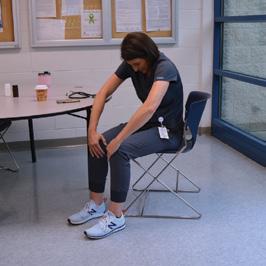

MSMS Live Virtual Meeting, 8:30 am – 4:15 pm. The meeting will include: 1-hr Medical Ethics, 2-hr Pain Management, 3-hr Implicit Bias. 7 AMA/PRA Category 1 CME Credits. Cost $270 members, $350 non-members, $180 retirees
May 15, 2023 ~ Tri-County Legislative Committee Meeting
In-Person Meeting at 6 pm, location to be announced. Physicians from Macomb, Oakland, and Wayne counties will meet with local legislators from the tri-county area.Anyone interested in attending the meeting contact Heidi Leach at macombcms@gmail.com or call 810-712-2546
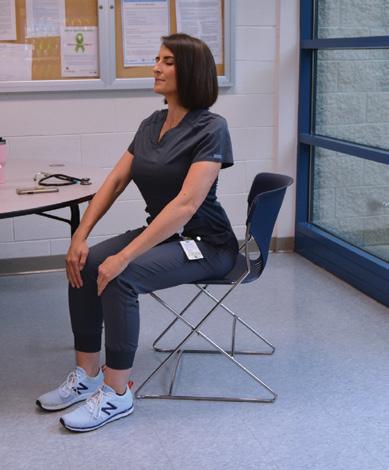

July 12, 2023 ~ MSMS Quarterly Membership Update
Live Virtual Meeting at 7 pm. Tom George, MD, MSMS Interim CEO will be hosting an update on MSMS activities. The presentation is free, but registration is required.
September 18, 2023 ~ Tri-County Legislative Committee Meeting
In-Person Meeting at 6 pm, location to be announced. Physicians from Macomb, Oakland and Wayne counties will meet with local legislators from the tri-county area. Anyone interested in attending the meeting contact Heidi Leach at macombcms@gmail.com or call 810-712-2546
October 11, 2023 ~ MSMS Quarterly Membership Update
Live Virtual Meeting at 7 pm. Tom George, MD, MSMS Interim CEO will be hosting an update on MSMS activities. The presentation is free, but registration is required.
October 30, 2023 ~ Tri-County Legislative Committee Meeting
Live Virtual Meeting at 7:30 am. Physicians from Macomb, Oakland and Wayne counties will meet with local legislators from the tri-county area. Anyone interested in joining the meeting contact Heidi Leach at macombcms@gmail.com or call 810-712-2546.
Chair Upward Hand Stretch
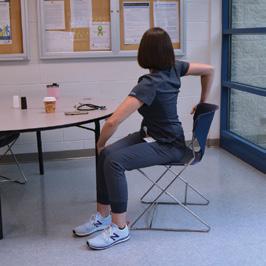
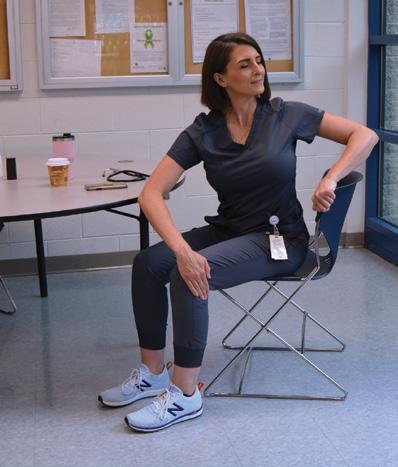
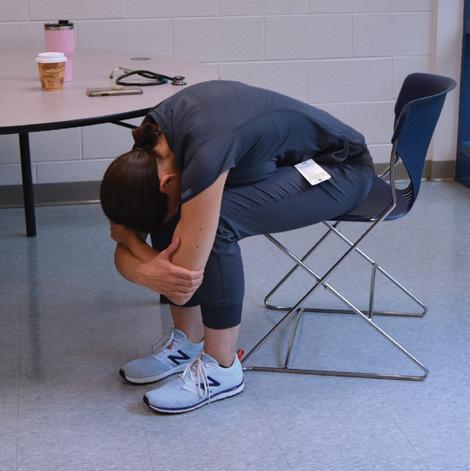
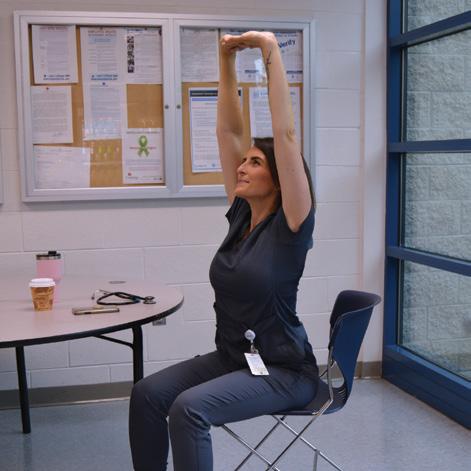




1. Bring arms in front of you, interlocking fingers (palms out).
2. Inhale. Raise



